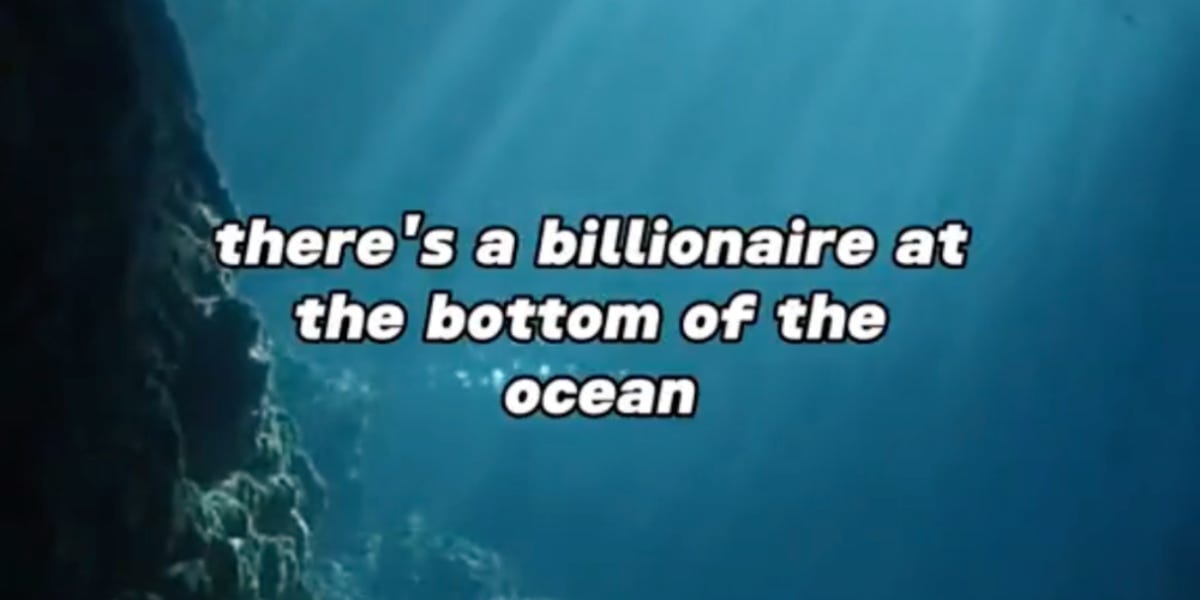
After all the attention paid to the Titan submersible and its lost crew this week, how could I not discuss it and the lessons it holds in this week’s roundup? I also felt the need to make a bit of a comment on the prospect of a “cage match” between Elon Musk and Mark Zuckerberg.
Since I didn’t get another post out during the week, I decided to make this roundup free for everyone because I realized it’s been a while since I’ve done that. If you’re already a paying subscriber, thank you for the support! And if you’re not paying yet and want to get the full issue every week, make sure to upgrade and help me keep writing Disconnect!
This was a busy week on my end, with a conference in Calgary and event in Edmonton last night — thanks to everyone who came out! I was also quoted in the Financial Times this week about what drives venture capitalists to fetishize “innovation” and I interviewed Brian Merchant on Tech Won’t Save Us about the Apple Vision Pro and the isolating vision of the future it presents.
Tech Won’t Save Us: We Don’t Need the Apple Vision Pro w/ Brian Merchant on Apple Podcasts
Have a great week, and thanks for reading!
— Paris
“Innovative” sub goes boom
This past week the world — or at least its media — was captivated by the story of a lost submersible in the North Atlantic that went searching for the Titanic, only to join it in a watery grave of its own. We now know that the submersible imploded in the hours after it launched, the sound of which was recorded by US Navy listening devices on Sunday. That means the passengers were killed in a fraction of a second, and didn’t spend days rationing oxygen until they suffocated, as was feared in sensationalized media coverage.
Speaking to ABC News after the implosion was confirmed, director James Cameron who did 33 submersible dives to the Titanic wreck, compared the two events. The captain of the Titanic was warned about the ice ahead, but steamed through it at full speed on a moonless night, causing the tragedy that killed 1,500 people. Similarly, Oceangate CEO Stockton Rush was warned by other colleagues working on deep submersibles about the Titan’s design flaws and bragged about his cavalier attitude toward safety, ultimately losing his own life and taking the lives of four others when it failed.
But what lessons should we take from this event? Rush was a “move fast and break things” entrepreneur like so many others in the tech industry, claiming that regulations stifle progress even when they’re in place for very legitimate reasons. It shows once again why we need to question the claims made by powerful people who see safety, environmental, and labor rules getting in the way of their business models and profit opportunities when those rules are there to protect us.
wrote a great piece for The Daily Beast about why this tragedy shows deep-sea exploration should be done with robots, not people.
Wrapping the submersible in the name of exploration and tourism may have been a way to attract investors, but if the ultimate goal was to produce a cheaper deep-sea submarine that could meet both commercial and scientific exploratory missions, Rush would have been better off working on uncrewed underwater robots.
This is also an argument frequently made about space exploration: why are we falling for Elon Musk’s and Jeff Bezos’ visions of space colonization, and going along with the chest-beating nature of the Artemis mission to send astronauts back to the moon when scientific exploration in such an unforgivable environment can — and is — much more easily done with robots than humans.
Bloomberg journalist Lauren Grush also makes the case that what’s happening in the private space industry isn’t so far from what Titan was doing under the waves. While the US Federal Aviation Administration (FAA) does have an obligation to ensure launches don’t harm the environment and bystanders, it can’t actually set safety standards on commercial spacecraft that carry people to space.
Grush explains that moratorium is the product of the 2004 Commercial Space Launch Amendments Act and has to be renewed every eight years, with the next renewal due for October. Her piece explains why it shouldn’t be renewed so the FAA can develop standards to ensure private space companies aren’t cutting corners on safety.
Mishaps have, however, happened. In July of 2021, when Virgin Galactic flew founder Richard Branson into space, the craft deviated from its intended flight path; and in 2014, a pilot died and another was seriously injured during a Virgin Galactic test flight. Just last year, a Blue Origin rocket meant for passengers crashed after its engine failed. No people were on board.
Whether in the ocean, in space, or here on land where tech companies are constantly stretching or breaking the rules in the hope authorities won’t respond until it’s too late, we need to constantly challenge the pressure to “move fast and break things” — because sometimes those things are actual people who lose their lives as a result.
Musk-Zuckerberg cage match
As the world was captivated by the story of the lost submersible, Elon Musk must have been frustrated his name wasn’t at the top of the headlines for a few days, because he quickly found a way to get back in the news. On Tuesday night, Musk posted on Twitter that he’d be “up for a cage match” with Mark Zuckerberg if the Meta billionaire was interested. Musk was responding to a tweet about Meta’s plans to launch a Twitter competitor in the coming months.
Zuckerberg has been doing jiu-jitsu for quite a while and training under a black belt who’s trained a number of UFC fighters. On Wednesday, Zuckerberg responded to Musk’s challenge with a screenshot on Instagram stories, overlaid with “Send the location.” Later that day, Musk tweeted a preference for the Vegas Octagon and explained his strategy: “I have this great move that I call “The Walrus”, where I just lie on top of my opponent & do nothing.” It brings to mind the photos of him on a yacht late last year.

Since then, Andrew Tate has offered to train Musk despite being charged with rape and human trafficking in Romania, as has UFC fighter Georges St-Pierre. UFC President Dana White also says they’re “dead serious about this.”
We’ll see where this goes, but it does make you wonder what is going on in the tech industry that you have two billionaires acting like YouTube influencers and challenging one another to a fight to prove who’s the most manly man of them all. Many of the powerful people in the industry have already embraced right-wing politics and find themselves incredibly disconnected from real life, and this does seem like another step in the direction of showing how much they’re losing the plot.
Recommended reads
Spider-Man: Across the Spider-Verse is a huge hit, but animators on the film say they were pushed to work 11 hour days, seven days a week for more than a year because Phil Lord couldn’t figure out what movie they were making. Vulture’s Chris Lee spoke to animators on the film to get their side of the story.
Who is Robert F. Kennedy Jr. and why is the tech elite getting behind him? In Slate, Jacob Silverman explains how RFK Jr. could be used to hurt Biden in a primary, making it easier for a Republican candidate like DeSantis to beat him.
Lily Sanchez and Nathan Robinson have a deeper dive into RFK Jr.’s politics in Current Affairs.
In The Nation, Edward Ongweso Jr. argues that Silicon Valley is built on a history of eugenics, environmental ruin, and surveillance. He dissects the implications of the industry and how it transforms the world, and asks whether it’s all worth it.
Billy Perrigo reports for Time that while Sam Altman was going around the world calling for AI regulation, OpenAI was lobbying the EU to make sure its products were carved out from many of the requirements of the AI Act.
Tara Isabella Burton has a fascinating piece digging into the evolution of the rationality community, and their shift away from reason to embracing “woo” and some religious ideas.
Writing for New York Magazine, Josh Dzieza explores the low-paid task labor essential to the AI boom that’s hidden by the claims it’s all just powerful algorithms.
Labor updates
- Bernie Sanders is the chairman of the US Senate’s Committee on Health, Education, Labor and Pensions. He’s using that post to launch an investigation into “dangerous and illegal” working conditions at Amazon warehouses.
- Directors Guild of America voted 87% in favor of ratifying their new contract.
- Apple is appealing a National Labor Relations Board ruling that it violated the rights of its workers.
In other news
The Binance fallout since the SEC revelations:
Binance is pulling out of the Netherlands.
Binance is under investigation in France over money laundering and illegal canvasing of clients.
Binance applied for deregistration in Cyprus.
The market regulator in Belgium ordered Binance to halt offering crypto services in the country.
GLAAD says Twitter is “the most dangerous platform for LGBTQ people.”
Elon Musk wants people to believe that “cisgender” is a slur.
The US Federal Trade Commission is suing Amazon, alleging it “used manipulative, coercive, or deceptive user-interface designs known as ‘dark patterns’ to trick consumers into enrolling in automatically-renewing Prime subscriptions,” then making it difficult to cancel.
Elon Musk keeps saying advertisers are flocking back to Twitter. But the companies he cites either never stopped advertising, or still haven’t returned.
Disney is facing criticism for using AI to generate visuals for its new Secret Invasion show.
GamesIndustry.biz has a great breakdown of the news from the first day of the hearing over the FTC’s attempt to stop Microsoft’s Activision Blizzard deal from closing.
Google is facing an antitrust investigation in Germany over service bundling in its in-car technology.
Meta plans to end access to news content on Facebook and Instagram in Canada in response to a new law that would force it to pay news publishers.
SmileDirectClub has been forced to release 17,000 US customers from non-disclosure agreements they were forced to sign to get a refund after having negative experiences with their teeth aligners.
Malaysia plans to prosecute Meta for not abiding by requests to remove content.
Australia’s eSafety Commissioner is demanding Twitter explain what it’s doing to tackle online hate, saying “toxicity and hate” has sharply increased since Elon Musk’s takeover.
Meanwhile, Musk said in a French television interview that Twitter would respect EU content moderation rules.
One more thing
Songwriter Emily Ricks wrote a song about the “billionaire at the bottom of the ocean” after seeing the story of the Titan submersible.










Member discussion